Betta fish are one of the easiest aquarium fishes to maintain, but they are also among the pickiest about their surroundings. If their needs aren’t met, betta fish can become stressed and even die from the conditions in the tank. Here are some tips for how to keep a betta fish happy and healthy:
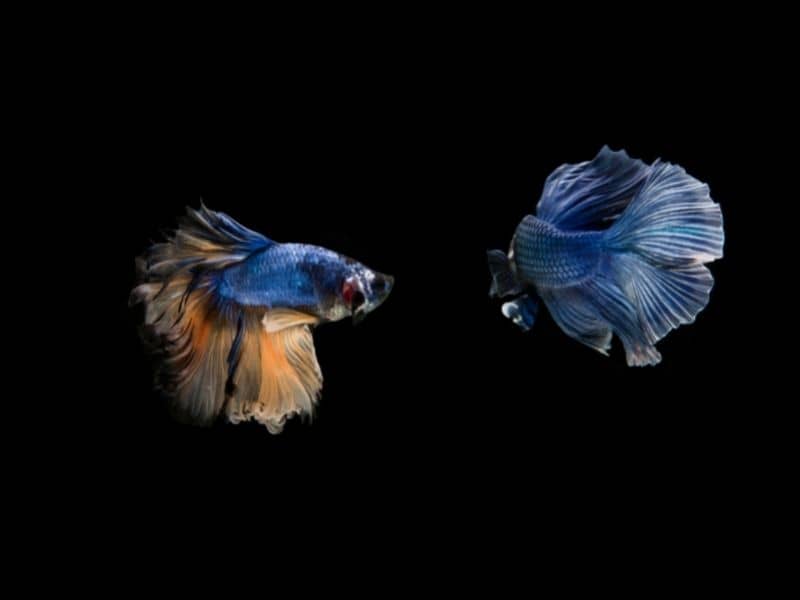
Provide A Reasonable Sized Home
Jump To
- 1 Provide A Reasonable Sized Home
- 2 Maintain The Water Quality
- 3 Add Plenty Of Decorations
- 4 Add Plenty Of Plants
- 5 Keep The Tank In A Calm And Quiet Place
- 6 Feed Your Betta Properly
- 7 Watch For Signs Of Illnesses
- 8 Beware Of The Tankmates
- 9 Interact With Your Betta
- 10 Conclusion on How To Keep A Betta Fish Happy
- 11 Related questions
Sure, bettas are labyrinth fish that can survive in extreme conditions, but that doesn’t mean you should keep them in a tiny bowl! Many people think that a tiny bowl is enough for these fish since they can survive in small spaces in the wild. But just like us, bettas also love the freedom to swim around, explore and have some space. So the best option is to get them a tank with plenty of room to explore.
A general rule of thumb is to provide at least 5 gallons of water for your betta. This will give them room to swim and explore, reducing stress levels and promoting healthy behavior.
Maintain The Water Quality
Betta fish are very sensitive to water quality, and a dirty tank can quickly lead to stress. To prevent this, you should perform regular water changes and clean the tank at least once a week. Make sure to use a dechlorinator and test the water for ammonia, nitrite, and nitrate levels to ensure the tank is safe for your betta.
The ideal water conditions for betta fish are:
- pH: 6.8 to 7.2
- Hardness: 5 to 20 dGH
- Temperature of 74-80°F (23-27°C)
- Nitrate levels of 20ppm or lower
- Ammonia and nitrite levels should be 0 ppm
To keep these levels in check, you can use a water conditioner and test the water regularly. You can use an aquarium water testing kit to make sure everything is safe and healthy.
Consistent Temperature
Bettas require warm water, so make sure their tank is kept at a consistent temperature of 78-80°F (25-27°C). If the water is too cold, it can cause stress and even death in betta fish. in any case the tank is too hot, it can cause health problems such as fin rot or diseases, so make sure to check the temperature regularly.
If you reside in a chilly region, you’ll need to invest in a heater and thermometer. This will help keep the water temperature consistent, providing your betta with a happy and healthy environment.
Provide Adequate Filtration
Bettas are sensitive to water quality, so it’s important to make sure their tank is properly filtered. A good filter should be able to keep the water clean and circulating, removing any dirt or debris from the tank. You should also make sure to change out your filter media regularly to prevent the build-up of waste in the tank.
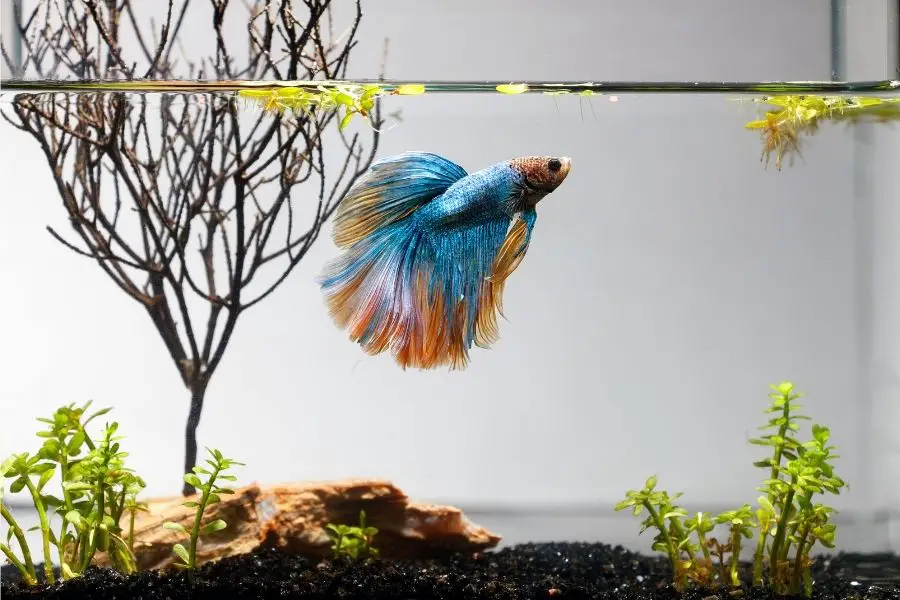
Add Plenty Of Decorations
Bettas love to explore and feel secure in their environment, so make sure to provide plenty of decorations for them to hide and swim around. Ornaments, caves, and other decorations will make the tank look more vivid and provide your betta with plenty of places to explore. Since bettas are long-finned fish, the decorations shouldn’t have any sharp edges that can tear their fins.
Fortunately, there are plenty of betta decorations available, ranging from natural-looking ornaments to colorful plastic plants. Among them, we like ceramic rock, rock caves, ceramic jars, and driftwood as they look great and provide plenty of hiding places.
Add Plenty Of Plants
Adding live plants to your betta tank is a great way to not only make the tank look more natural and appealing but also to provide your betta with a healthy and comfortable environment. Plants help to oxygenate the water and keep the tank clean, and they can provide a hiding place for your betta if he needs some privacy. Further, bettas naturally appreciate the presence of plants because they are used to living in shallow waters with dense vegetation in the wild.
Not all plants are suitable for bettas. However, you’ll want to choose plants that are sturdy and hardy since bettas like to swim around and explore their surroundings. Some good plant choices for a betta tank include large anubias plants, tall background plants, and floating plants. If you can’t take the responsibility of live plants, moss balls or Indian almond leaves are a good alternative; they act as fallen foliage and have mild antibiotic and antifungal properties. Adding plants to your betta tank is a great way to create a healthy and comfortable environment for your fish, so be sure to include plenty of plants in your tank!
Keep The Tank In A Calm And Quiet Place
The ideal environment for a betta fish is one in which the water is kept clean and calm. Bettas do not do well in tanks that are exposed to a lot of noise or movement, as this can cause stress and make the fish more susceptible to disease. In addition, bettas should be kept in tanks with a consistent temperature, as changes in temperature can also be stressful.
Therefore, make sure that the tank is not placed near a window or in an area with a lot of noise and activity. A quiet corner with minimal disturbances will provide your betta with the ideal environment for a healthy and happy life.
Also, you should avoid sunny or brightly lit areas since bettas are native to shallow and murky waters in the wild. Too much light and warmth can be stressful for bettas, so be sure to keep their tank in a cool, shaded area.
It is also better to avoid Air Conditioners, fans, and other appliances that can cause fluctuations in the water temperature. If you must have them, make sure to shield your betta tank from direct contact with the appliance.
Finally, make sure that the tank is far away from children or pets who can accidentally knock it over or disturb your fish. Your betta fish will be delighted and healthy for many years to come if you provide him or her with the proper setting and some care!
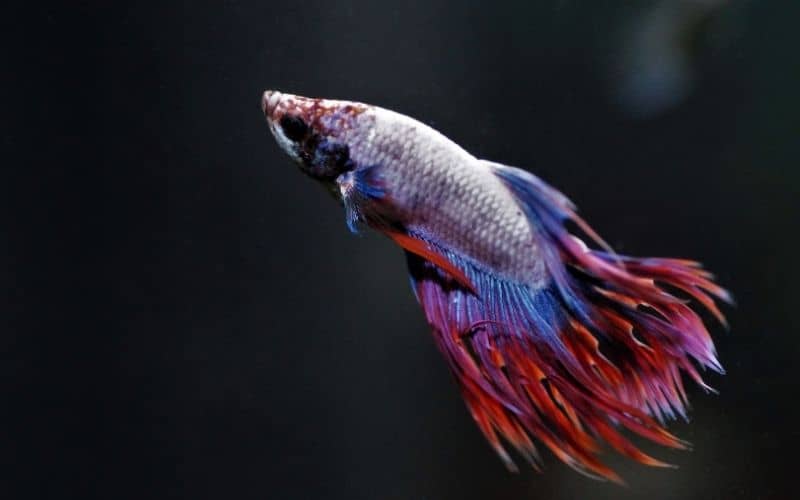
Feed Your Betta Properly
Bettas are omnivorous and do well on a varied diet. A good betta food should contain plenty of protein from fish meals, shrimp, and other sources. Vegetables such as spinach and spirulina can also be included in the diet for additional nutrition. You can also offer occasional treats of live foods such as brine shrimp or bloodworms.
If you don’t have enough time to feed your betta a variety of foods, you can provide him with an all-in-one pellet food. However, to ensure that the food is made especially for betta fish and contains the appropriate nutrients, you should purchase a quality brand of betta food.
You should also keep in mind that bettas are naturally used to eating plenty of small meals throughout the day. But you should limit the amount of food you give your betta to one or two pellets at a time to avoid overfeeding.
It is important to avoid overfeeding, as this can lead your fish to obesity and other health problems. You should only feed your betta as much as he can consume in three minutes and remove any uneaten food after that time.
Keeping the tank clean is also essential for a healthy betta. Regular water changes are important to keep the water quality balanced and free of toxins. You should also remove any uneaten food, waste, and dead plants from the tank as soon as possible to keep it clean and healthy.
Watch For Signs Of Illnesses
Bettas are generally hardy and easy to care for, but they can still become sick if the water parameters are not kept balanced or if they don’t get enough nutrition. Regularly observing your fish can help you detect signs of illness early on and take action.
Look for changes in behavior, such as listlessness or hiding, or physical changes, such as discoloration or clamped fins. If you notice any unusual behavior, perform a water test to check for levels of ammonia and nitrites, and take steps to correct any imbalances.
Also, watch out for signs of parasites or disease, such as white spots or frayed fins. If you notice any of these symptoms, quarantine the afflicted fish and seek treatment from a qualified veterinarian.
Beware Of The Tankmates
Bettas are territorial and can become aggressive if kept with other fish. It is best to keep bettas in their own tank to avoid any problems. Especially, you MUST not keep two or more bettas in the same tank, as they will fight each other. Bettas will also fight with fish with the same coloration and long fins, so it is best to avoid keeping those types of fish in the same tank.
If you want to add other fish or invertebrates to your tank, make sure they are compatible with bettas. Hardier fish, such as guppies or barbs, can be good tankmates for bettas, but be sure to do research on any potential tankmate before adding it to the tank.
You must also avoid adding any aggressive fish to the tank, as they can cause additional stress for your betta.
Also, make sure that the tank is large enough to give all the fish plenty of room to swim without being crowded. It is also important to avoid overstocking the tank, as this can cause water quality problems and stress for the fish.
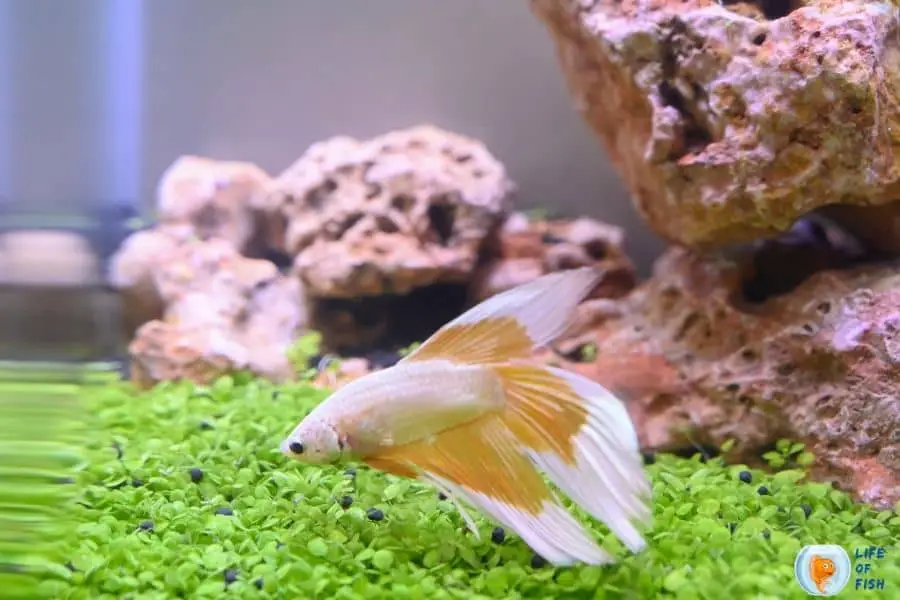
Interact With Your Betta
The aggressive nature and intelligence of betta fish can make them interesting and rewarding pets. You can interact with your betta in a variety of ways, such as offering them treats or playing with toys.
Here are some fun activities you can try with your betta:
Feed them their favorite treats by hand
Bettas are interactive pets that will enjoy the presence of their owners. You can hand-feed them their favorite treats, such as bloodworms or brine shrimp, to form a bond with your betta and let them know you’re there.
Play games with them
Bettas can be trained to play simple games, such as following your finger or swimming through a maze, which can be both entertaining and educational.
Use toys to keep them entertained.
Bettas enjoy playing with toys, such as floating rings or ping-pong balls. These toys can help keep them entertained and stimulate their natural curiosity. Speaking of toys, we like the floating betta log and the floating betta exercise mirror.
Provide mental stimulation
In addition to physical exercise, bettas need mental stimulation. There are a variety of products available to help keep your betta mentally stimulated, from puzzles to mazes.
Conclusion on How To Keep A Betta Fish Happy
Betta fish are some of the most attractive aquarium fish around. However, if you want to keep your betta happy and healthy, it’s critical to provide them with a well-maintained tank, nutritious food, and plenty of interaction. You can enjoy many years of companionship with your betta with proper care.
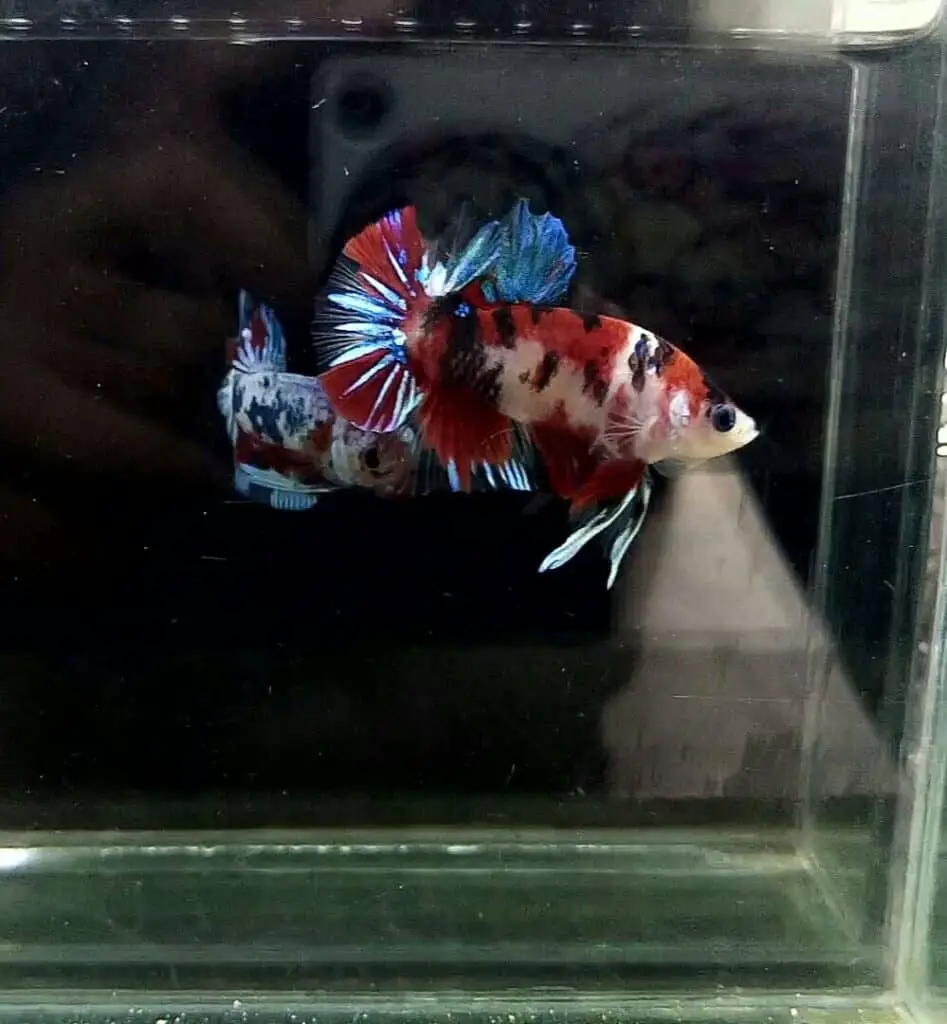
Related questions
How can you tell if a betta fish is happy?
A happy betta fish will have bright colors, an active demeanor, and no signs of disease. He or she should be swimming around their tank and interacting with their environment. They should also eat regularly and respond to your presence in a friendly manner.
How long do betta fish live?
Betta fish can live up to 3-5 years with proper care. However, the average lifespan for betta fish is usually 2-3 years.
What types of food can betta fish eat?
Bettas are omnivorous and should be fed a variety of foods such as blood worms, brine shrimp, pellets, and flakes. Some bettas also enjoy live or frozen food. Be sure to vary your betta’s diet to ensure they receive all the nutrients they need.
Do betta fish get lonely?
Betta fish are solitary creatures and do not require the company of other fish. However, they will become bored if they lack stimulation, so giving them plenty of toys and interactive activities is important.
Read Next : Baby Axolotl Care, Breeding, Feeding And Tank Mates
